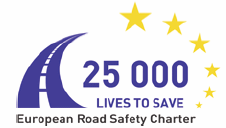European Road Safety Charter
ERSC: Road safety in Sweden
 Sweden's long-term road safety goal is that there should be no fatalities or serious injuries in road traffic. This goal was approved by the Swedish Parliament in 1997 and is based on the "Vision Zero" program. Sweden is among those countries with the lowest number of traffic fatalities in relation to its population. This is not enough, however. Swedish road safety work is based on a refusal to accept human deaths or lifelong suffering as a result of road traffic. Sweden's long-term road safety goal is that there should be no fatalities or serious injuries in road traffic. This goal was approved by the Swedish Parliament in 1997 and is based on the "Vision Zero" program. Sweden is among those countries with the lowest number of traffic fatalities in relation to its population. This is not enough, however. Swedish road safety work is based on a refusal to accept human deaths or lifelong suffering as a result of road traffic.
The Swedish National Road Administration (Trafikverket) manages the country's state-owned road network and has overall national responsibility for safety on all roads in Sweden.
The main participants in road safety work are the National Road Administration, the police and Sweden's 289 municipalities, which cover the entire territory of the country. Other important participants are the county administrative boards (i.e. branches of the central government), the National Society for Road Safety (Nation-alföreningen för trafiksäkerhetens främjande, NTF) and the transportation and automotive industries. The automotive industry has major potential to improve road safety by changing the design of vehicles. Over the past decade, vehicles have become safer and safer. Crash tests conducted by the independent European New Car Assessment Program (Euro NCAP), in which Sweden is represented are particular benefit. The Swedish Motor Vehicle Inspection Company (AB Svensk Bilprovning) is responsible for annual inspections of all vehicles registered in Sweden
In spring 1999 the Swedish government presented eleven points aimed at strengthening and stimulating road safety work, along with examples of what they mean in practice:
1. A focus on the most dangerous roads
Concentrate on the most dangerous stretches of road.
2. Safer traffic in built-up areas
Majority of municipalities analyzed their street networks from a safety standpoint. This led to reconfiguration and thus safer street environments in a number of municipalities. These efforts are continuing.
3. Emphasis on the responsibilities of road users
A greater respect for traffic rules is needed. Speed limits, seatbelt use and elimination of driving under the influence of alcohol or drugs are particularly important. Efforts to make the enforcement of speed limits more effective have begun.
4. Safe bicycle traffic
A voluntary bicycle safety standard has been introduced.There are regular campaigns to increase the use of bicycle helmets.
5. Quality assurance in transport work
Public agencies with large transportation needs will receive instructions on how to assure the quality of their own transportation services and those procured from outside firms, in terms of traffic safety and environmental impact.
6. Winter tire requirement
A new law mandating the use of winter tires on cars under winter road conditions between 1 December and 31 March.
7. Making better use of Swedish technology
Introducing new technology to improve road safety will be acceler ated. Technology that can be introduced relatively soon includes more effective seatbelt reminders and systems that support adjustments of speed limits. Technology under development includes ignition locks that prevent drunk driving and electronic driver's licenses.
8. Responsibilities of road transport system designers
The Inquiry Commission recently presented a proposal that clarifies the responsibilities of the public sector and the business community for safe road traffic. The commision proposed the establishment of an independent road traffic inspectorate.
9. Public responses to traffic violations
The Inquiry Commission is reviewing existing traffic violation rules and will propose changes from the perspective of Vision Zero and of ensuring due process of law.
10. The role of voluntary organizations
The government is evaluating the road safety work of NTF and its use of State funds. NTF is a grassroots organization whose members include 24 county road safety federations and some 70 national organizations. A large proportion of its work is state-financed.
11. Alternative forms of new roads financing
The studies of the potential for supplementing public financing with other forms of financing for major road projects are underway.
IMPORTANT LAWS AND REGULATIONS
One guiding principle of Vision Zero, and thus of Swedish road safety work, is that people should value road safety so highly that they naturally behave as responsible road users and follow traffic ground rules. The Swedish Parliament decided in June 2009 on a new interim target for road safety, whereby the number of fatalities was to be halved and the number of serious injuries was to be reduced by a quarter from 2007 to 2020.
Source: The Swedish National Road Administration trafikverket@trafikverket.se
|